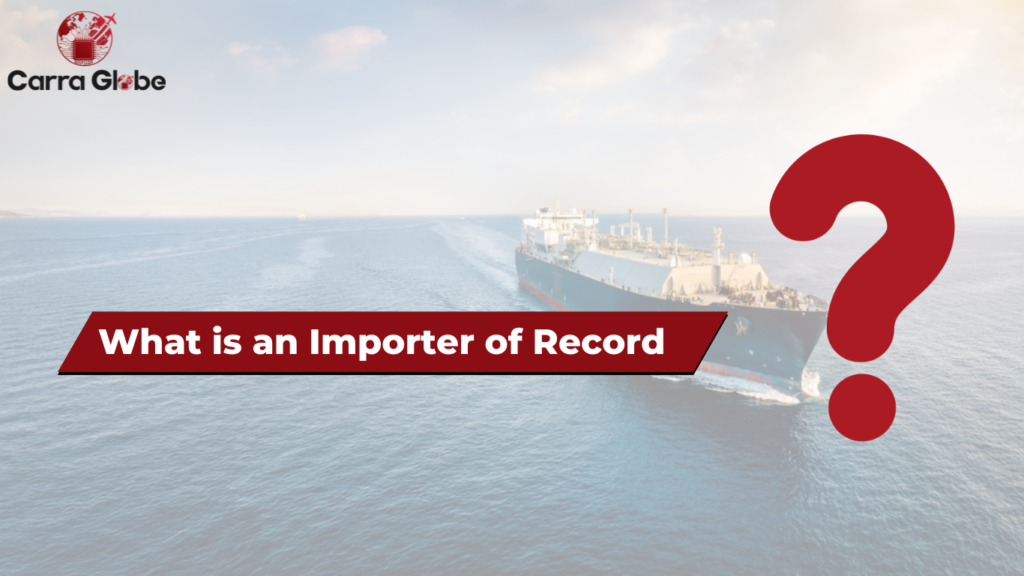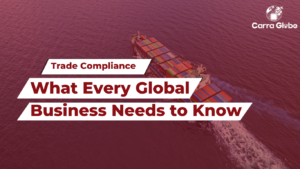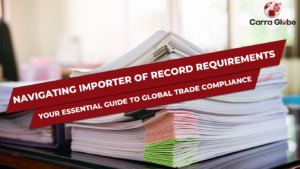A Game-Changer for Your Business Growth
International trade opens up endless possibilities for businesses. However, it also presents unique challenges, especially when dealing with the complexities of customs, duties, and compliance. One crucial concept in this process is understanding what is an importer of record (IOR).
The IOR is a critical player in ensuring goods move seamlessly across borders. Whether you’re a small business dipping its toes into global markets or a seasoned logistics professional, knowing the IOR’s role is invaluable. In this guide, we’ll explore the responsibilities, benefits, and challenges of the IOR, along with its growing importance in the modern trade landscape.
What is an Importer of Record (IOR)?
An Importer of Record (IOR) is the individual, business, or entity legally responsible for ensuring imported goods meet the regulations of the destination country. The IOR acts as the legal entity that ensures shipments comply with customs laws and handles duties, taxes, and documentation.
For further details on customs compliance, visit the World Customs Organization (WCO), which provides comprehensive resources on international trade standards. To understand how the IOR differs from an EOR, check out our blog on the IOR vs. EOR guide.
Key Duties of an IOR
- Customs Documentation: Filing and submitting accurate paperwork, including invoices, packing lists, and import permits.
- Duty and Tax Payments: Paying all applicable customs duties, taxes, and tariffs to clear shipments.
- Regulatory Compliance: Ensuring the imported goods meet the country’s safety, environmental, and trade standards.
- Record Maintenance: Keeping detailed records of imports for audits or legal purposes.
Without the IOR, the importing process becomes chaotic and risky, potentially leading to delays, penalties, or confiscation of goods. For a closer look at document management, visit our guide on import delivery document management.
Why Does the Importer of Record Matter?
To understand what is an importer of record, it’s essential to grasp why this role is vital. The IOR ensures businesses can operate across borders without facing legal, financial, or logistical setbacks.
1. Simplifies Complex Trade Regulations
Every country has its trade laws, which can be difficult to navigate. An IOR streamlines this process by ensuring compliance with rules, from labeling and packaging to permits and certifications.
For a deeper dive into global trade policies, check out the International Trade Administration (ITA), which offers guidelines for businesses involved in international trade.
2. Protects Against Legal Risks
Importing goods without understanding compliance requirements can lead to hefty fines or even criminal charges. The IOR mitigates these risks by handling all legal responsibilities. Learn more in our article on trade compliance expertise.
3. Ensures Timely Shipments
Customs delays can disrupt supply chains and harm customer satisfaction. The IOR’s expertise ensures that goods are cleared quickly, avoiding unnecessary delays.
4. Enables Business Growth
For businesses looking to expand globally, the IOR handles the complexities of international trade, allowing companies to focus on scaling their operations.
How Does the IOR Work in Real-Life Scenarios?
To illustrate what is an importer of record, consider a U.S.-based e-commerce company shipping consumer electronics to the European Union (EU).
Step-by-Step Role of the IOR
- Customs Clearance: The IOR files the necessary customs declaration forms, ensuring all details, such as product classification codes and values, are accurate.
- Duties and Taxes: They calculate and pay the required customs duties, VAT, and other applicable fees.
- Regulatory Checks: The IOR ensures the electronics meet EU safety standards, such as CE marking compliance, required for products entering the European market. Read more in our article on IOR’s role in IT and electronics imports.
- Shipment Monitoring: They track the shipment’s progress, ensuring it clears customs without issues.
By managing these responsibilities, the IOR helps the company focus on its core business rather than navigating the complexities of global trade.
Responsibilities of an Importer of Record
The IOR plays a pivotal role in the global supply chain. Their responsibilities extend beyond customs clearance and tax payments.
1. Ensuring Accurate Documentation
Customs forms, invoices, and shipping documents must be filled out with precision. Errors can lead to delays or fines. For classification and tariff details, businesses often refer to the Harmonized System (HS) Codes maintained by the WCO.
2. Paying Import Costs
Customs duties, VAT, excise taxes, and other fees are essential for legal clearance. The IOR handles these payments to ensure smooth entry.
3. Meeting Regulatory Standards
Depending on the product, countries may have specific regulations. For example:
- Pharmaceuticals: Require import licenses and safety certifications. Learn more at the World Health Organization (WHO).
- Electronics: Need compliance with safety standards like UL or CE.
- Food Products: Must meet health and safety guidelines outlined by the Food and Agriculture Organization (FAO).
4. Record-Keeping
Authorities often audit import records to ensure compliance. The IOR maintains detailed documentation to avoid penalties and provide transparency. Discover more about documentation services in our blog on import-export documentation.
When Should You Partner with an IOR Specialist?
Acting as your IOR might seem cost-effective, but it can lead to challenges. Partnering with an experienced IOR service is beneficial when:
- You’re Expanding Globally: New markets come with unfamiliar trade regulations.
- Shipping High-Value or Regulated Goods: These require extra attention to detail and compliance.
- Managing High Shipment Volumes: Scaling your supply chain requires expertise to prevent bottlenecks.
By outsourcing to a professional, businesses gain peace of mind and operational efficiency.
Trends Shaping the Role of the Importer of Record
As global trade evolves, the IOR’s role is becoming even more critical. Here are some trends making the IOR indispensable:
1. E-Commerce Boom
The rapid growth of e-commerce has increased cross-border shipments, especially for small businesses. These businesses often rely on IOR services to manage their imports efficiently.
2. Stricter Trade Policies
Countries are enforcing stricter rules for imports, such as eco-friendly packaging laws or new product certifications. Learn more about such regulations at the United Nations Conference on Trade and Development (UNCTAD).
3. Technological Integration
Advanced tools like blockchain and AI are transforming trade. IORs are leveraging these technologies to automate documentation, track shipments, and improve compliance accuracy.
4. Growing Sustainability Demands
Sustainability is becoming a priority in trade. IORs ensure goods meet environmental standards, such as reduced carbon footprints or biodegradable packaging.
Why the IOR is a Key Trade Partner
Understanding what is an importer of record is essential for businesses navigating international markets. The IOR’s expertise ensures goods move legally, efficiently, and safely, reducing risks and enabling growth.
For businesses large and small, the IOR simplifies the complexities of global trade. Ensuring compliance with customs laws and managing import responsibilities enables companies to focus on their core objectives—growing their business and delivering value to customers. If you’re expanding into new markets or facing import challenges, partnering with a reliable IOR service like Carra Globe can make all the difference.




